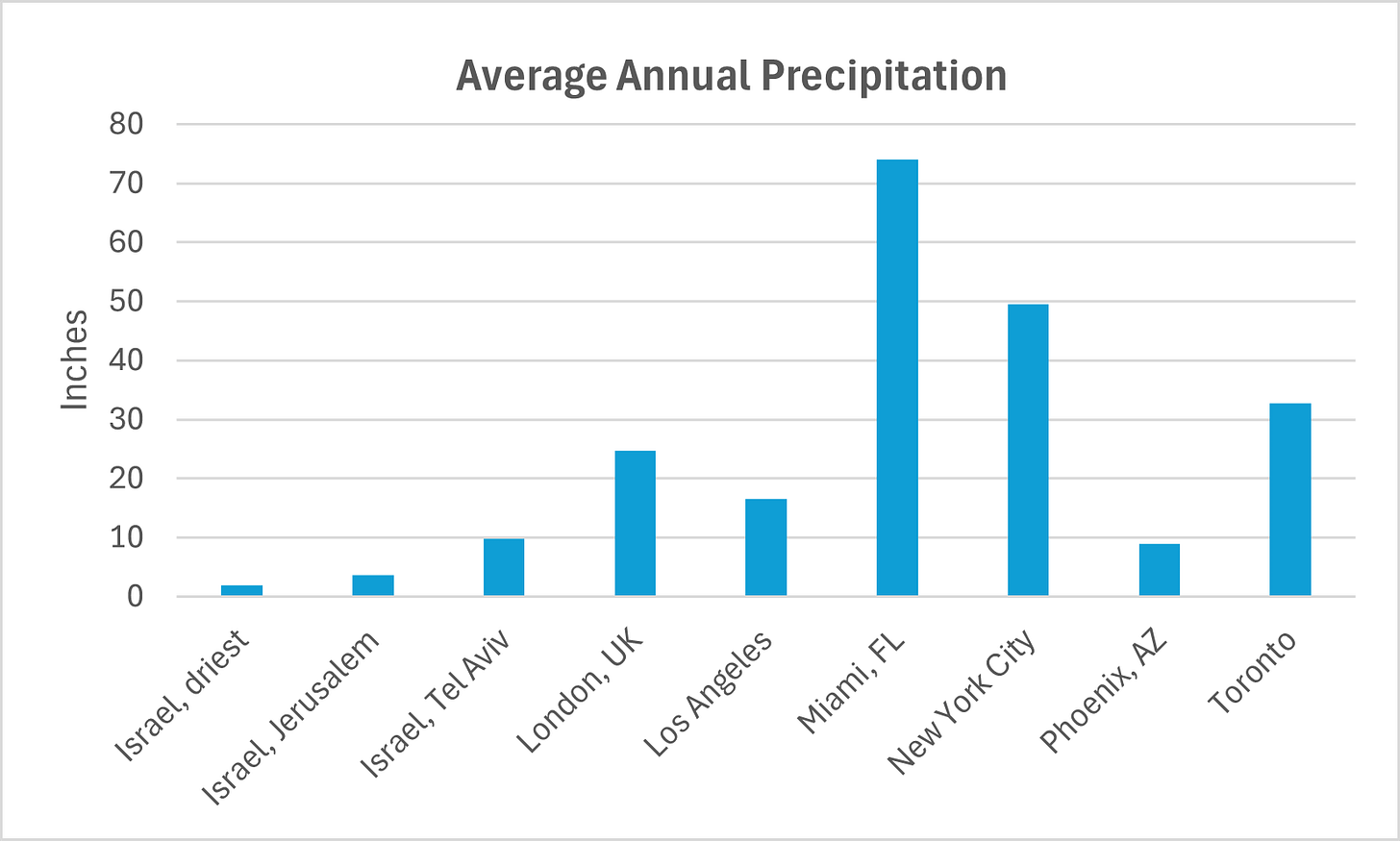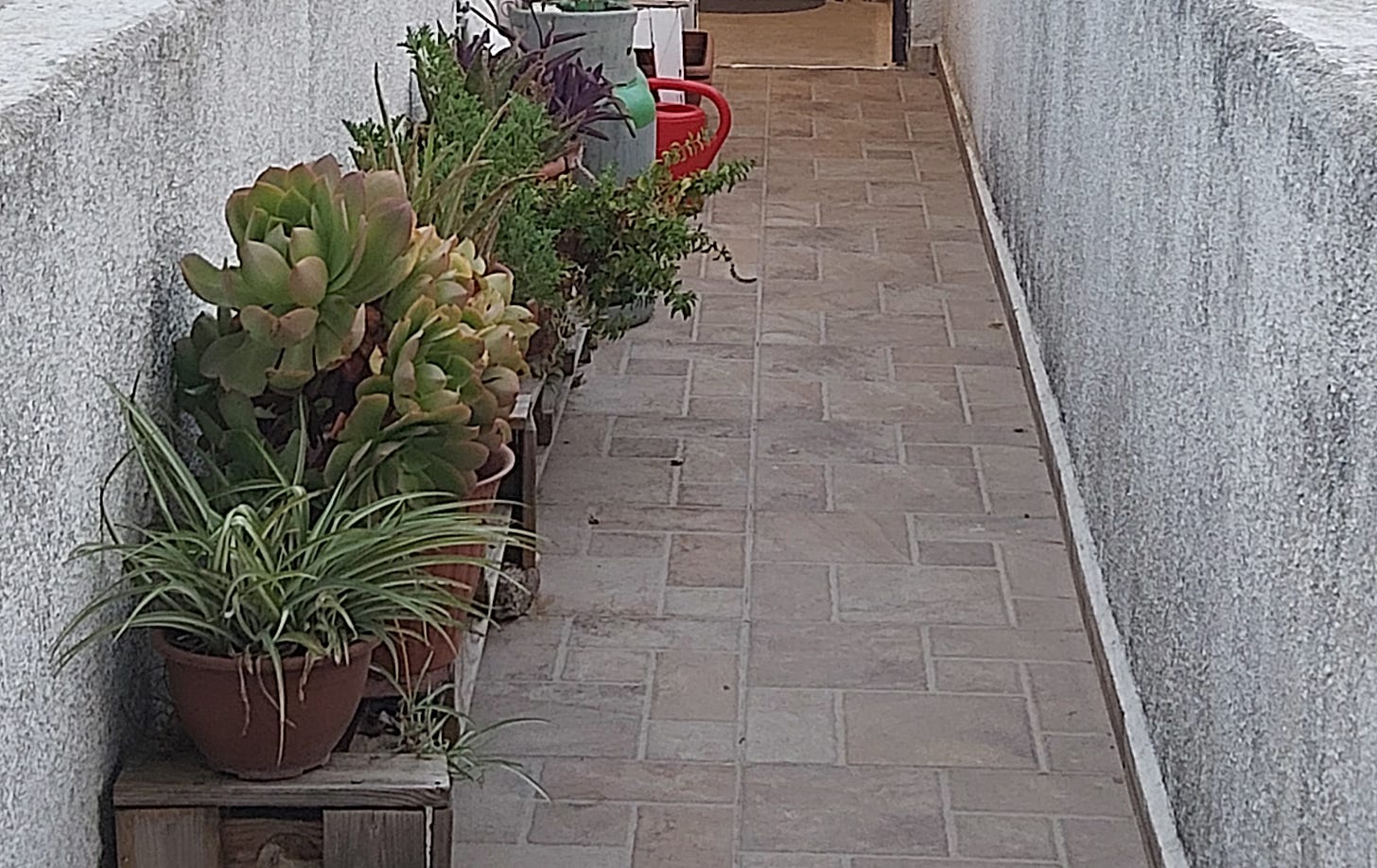Weather in Israel, Part 1
A series on nature and the Jewish religion for children 9-14.
Introduction
The Jewish religion and monotheism—the belief in only one god—began in Israel about 3,300 years ago. Religions are ways people relate to what they consider holy.1 Judaism is more than a religion. It is very concerned with God and holy things. But it is also concerned with how people live: how they interact with other people, animals, and things.
The earliest Jews were shepherds. The Torah, the first part of the Tanakh2 or Jewish Bible, talks about Jacob, who was a shepherd for his father-in-law, Laban. Moses was also a shepherd—first of his father-in-law Yitro’s (Jethro’s) flocks and then of the Jewish people as he led them out of slavery in Egypt. In later generations, farming became important.
Many laws and lessons in the Tanakh are concerned with the things that affect shepherds and farmers, among others. This includes the weather.
This is the first of a series of articles about weather in Israel and how it relates to Judaism.
Nature and the Jewish Religion
Israel has two seasons, sunny (summer) and rainy (winter). Spring and fall are not even mentioned in the Tanakh because they really do not exist. In the Tanakh, “Aviv,” the word for spring used in modern Israel, means the month when barley ripens. This is the Hebrew month of Nissan, when Passover occurs, late March or April.
Spring and fall were added later because of the influence from two conquerors from north, Rome (Italy) and Greece. Those countries have four different seasons. In Israel today, “spring” and “fall” are used because they are used in most of the world. But they only last a few weeks, not a full “season.”
Rain in Israel
Israel is a very small country, but it has several different climates. One thing is true for the whole country: rain only falls in the winter.
More than 50% of Israel is arid or semi-arid: it has very little water or rainfall. The average annual rainfall (what falls in one year) ranges from less than two inches (50 mm) in some places to around 10 inches (250 mm) in others.
This chart shows the average annual precipitation (rain plus melted snow) in several places around the world. The chart is in inches, but if you use metric you can still understand.
Today, Israel depends on three sources for water:
fresh, natural water that is pure enough for drinking;
wastewater produced by treating sewage. It can be used for irrigation or can be flowed into streams;
sea water that has the salt removed to make drinking water.
These three sources give Israel enough water. As recently as 60 years ago, however, water was precious and very expensive. An advertising slogan was, “Be careful of every drop.” And thousands of years ago, when Judaism began, it was even more precious.
The Bible talks about two important droughts (times when there wasn’t enough rain for crops to grow). Abraham and Sarah went down to Egypt because of a drought, and Jacob sent his sons down to Egypt because of another drought. (Egypt gets its water from the Nile River, not from rain. Even when there wasn’t enough rain to grow crops in the Holy Land, there was food in Egypt.)
Praying for Rain
Shemini Atzeret/Simchat Torah is the very last day of the three-week High Holiday period in Israel. Outside of Israel, these fall on two days. On Shemini Atzeret, a special prayer for rain is said. In Ashkenazi3 synagogues, Tefillat Geshem, is said after the Torah reading in the morning prayers. The prayer mentions ways water was used to serve God by our patriarchs and leaders. The prayer ends by asking God to bring rain
For a blessing and not a curse,
For life and not for death,
For plenty and not for scarcity.
Jews from North Africa and Asia, and others who use the slightly different Eidat ha-Mizrach prayers,4 recite Tikkun Hageshem. Like Ashkenazim, they recite it at or just before the last section of morning prayers. The prayerbooks of different communities use slightly different versions, but the purpose is the same: to ask God to give us the wind and rain that we need—not too much and not too little.
Besides these special, once-a-year prayers, we also have phrases that we say every time we recite the Shemonah Esrei. This prayer, also called the Amidah, is one of the most important daily prayers. Beginning with the Musaf 5 service on Shemini Atzeret and ending with Shacharit on the first day of Passover we say,
He causes the wind to blow and the rain to fall. משיב הרוח ומוריד הגשם
Starting with Musaf on the first day of Passover and ending with the Shacharit service on Shemini Atzeret we say,
He causes the dew to descend. מוריד הטל
Living with the Rain
We in Israel are always glad to see rain. Here, people almost never complain about it. After a couple of weeks of solid rain, we might complain about not seeing the sun. But we greet rain with a smile.
After every big storm the news reports the rise in water level of the Kinneret, the big lake at the northeast of Israel, also called the Sea of Galilee. The Kinneret is a major source of water for the country.
This year, two days after we began saying “He causes the wind to blow,” the wind started wailing around my living room window. All summer we had breezes, but not a really strong wind like that one.
This past Sunday we had the first real rain of this winter. It started with a lot of thunder, rolling booms very close together. Here in the north of Israel near Lebanon, at first we did not know what we heard. Was it thunder or the sound of our Iron Dome destroying Hezbollah missiles? Then we started to see lightning.
I stepped outside to say the blessing over lightning,
בָּרוּךְ אַתָּה ה' אֱלֹקֵינוּ מֶלֶךְ הָעוֹלָם, עוֹשֶׂה מַעֲשֵׂה בְרֵאשִׁית
Blessed are you, Lord our God, King of the universe,
Who performs the work of creation.And then on thunder,
בָּרוּךְ אַתָּה ה' אֱלֹקֵינוּ מֶלֶךְ הָעוֹלָם, שֶׁכֹּחוֹ וּגְבוּרָתוֹ מָלֵא עוֹלָם
Blessed are you, Lord our God, King of the Universe,
Whose power and might fill the world.These blessings remind us of God’s power. He created and controls all of nature, from the smallest drop of water to huge forces like lightning.
In a moment the rain started. At first it was just a sprinkle. Then it got a little harder, and the air started to smell fresher. I could almost see my pots of plants perk up. Then the rain became heavy, so I ran back inside.
A pounding on the plastic roof over my entry had me stepping outside again. Hail, as big as marbles, was falling. Usually our hail is about the size of a pencil’s eraser. This hail only lasted a couple of minutes. Then the rain came down hard. In about fifteen minutes, the storm was over.
The Hebrew months move back and forth through the secular months, but the weather follows the Hebrew ones. Whether Shemini Atzeret falls in late September or late October, the winds and rains start almost immediately after.
Rain is Important in Judaism
The Jewish religion began in Israel. It has always been more than just worship of God who created the world. And unlike other major religions, it does not focus on what happens after people die. Judaism is concerned with living: how we each live our lives, and how we live together in society. If we do our imperfect best and follow a few simple rules, our souls will return to the next world. Judaism teaches that this is true for all people, not just Jews.6
Part of this is the understanding that everything we have comes from God. Even nature is God’s creation. (“Mother Nature” comes from the Greek and Roman belief in many gods and goddesses.) Judaism teaches us to say “Thank you” for things we get, both from people and from God.
Rain is one of the many blessings that comes from God. God tells us,
“If you listen to my commandments that I command you today—to love G d, your G d, and serve Him with all of your heart and with all your soul, then I will give you rain for your land in its proper time, the early and the late rains.”7
This tells us that rain does not just happen to fall. God brings the rain when we love Him and serve Him. “Serving” Him does not just mean prayers and sacrifices. It also means following the laws He gave us for living together peaceably. When we disobey His laws, He either stops the rain or brings destructive floods.
Water as a Symbol
The Talmud teaches us, “The day when rain falls is as great as the day on which heaven and earth were created.”8 It also compares water to Torah. Jews need Torah just as humans need water.9
The proper balance of rain and sun are both needed for life. Rain reminds us that in the same way, we need balance between our spiritual and physical lives.10
Conclusion
Next time there’s a thunderstorm, thank God for creating the world and everything in it, including thunder and lightning. If you don’t know the traditional blessing, that’s okay; you can still thank Him. When it rains, remember how the world needs rain. And do your best to live a good and grateful life—even your little prayer will help God know that the world still deserves His help.
Religion. Britannica, https://www.britannica.com/topic/religion, accessed Nov. 3, 2024.
The Torah, or Five Books of Moses, are part of the Tanakh, the Jewish Bible. Christians call the Tanakh the “Old Testament.” Here’s a listing of the books of the Tanakh.
Ashkenazi Jews are those who follow the traditions of Jews who settled in most of Europe beginning over 1,000 years ago. The plural, Ashkenazim, is used without the word “Jews.”
This group is mistakenly called “Sephardic” in the USA. Sephardic technically means Jews who lived in Spain and Portugal until the Inquisition, when they were expelled (Spain: 1492; Portugal, 1495). However, today it is used to include Jews whose ancestors never left Asia, having been exiled to the east before the Roman conquest in 70 AD. They lived in Iraq, Iran, and Afghanistan, among other places.
The morning prayers include three sections: Shaharith, the Torah service, and Musaf. Shaharith is mostly praise, recognition of God’s kingship, and gratitude; on weekdays it also includes petitionary prayer. The Torah service is when the Torah is read, which does not occur on most weekdays. Musaf is only said on Sabbaths and holidays. It describes the special Temple service and its sacrifices, which ended when the Second Temple was destroyed in 70 CE. All services end with several blessings including the Aleinu, the communal recognition of God’s kingship and protection.
Jewish Concepts: The Seven Noachide Laws. https://jewishvirtuallibrary.org/the-seven-noachide-laws, accessed Nov. 5, 2024.
Deuteronomy 11:13-14
Talmud, Taanit 8b
Talmud, Bava Kama 17a
Bolotin, K., Rain’s Spiritual Significance Revealed. https://www.chabad.org/theJewishWoman/article_cdo/aid/6028720/jewish/Rains-Spiritual-Significance-Revealed.htm, accessed Nov. 5, 2024.





You are an amazing scholar! Thank you for dating the origin of the Jewish religion at about 3300 years ago. I've been looking for that answer for many years. Your explanations of the Jewish religion are also just what I've been looking for. I do wish that your writings were collected and published. They are very helpful and fascinating to me.
Jeff
Lovely engaging article. I too thought the first thunder we heard was maybe the iron dome, lol